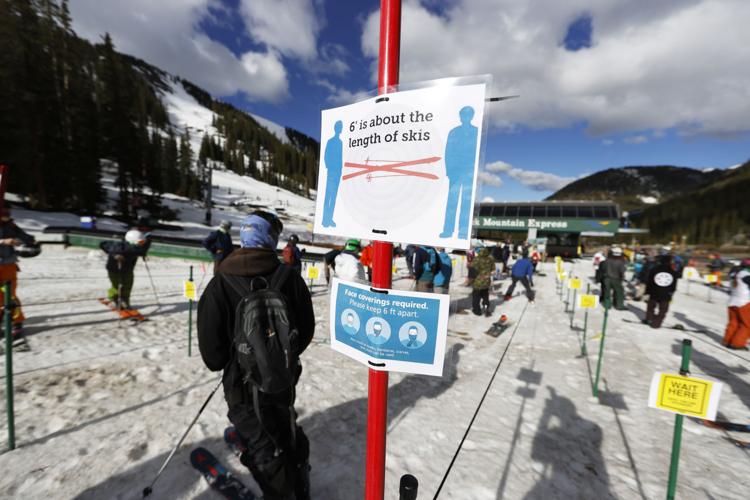This is the time of year when we usually make our season pass decisions. Ikon or Epic? Which level? Or should we go with an independent mountain, instead?
It’s not an easy decision. We have to evaluate where we plan to ski next year, what trips we want to take, and how many days we think we’ll manage. It requires a lot of reflection and planning, as well as analysis worthy of an experienced actuary.
This year it’s gotten a whole lot tougher. Because now there’s a pandemic thrown into the mix, and no one knows exactly what’s going to happen. There are so many questions: Will the season have a delayed start? Will resorts limit the number of days we can ski, or how many skiers they’ll allow on the hill? And the biggest question of all: Will there even be a ski season next year? And if there is, will we still want to ski? After all, ski towns were among the earliest hotspots of the pandemic (see this excellent article in The New Yorker). So will we want to climb onto a gondola, tram, or even a lift with people who have the potential to infect us? Add onto this the uncertainty that many of us are facing with our personal finances, and it’s easy to understand why we’re holding tight to our credit cards.
The coronavirus has hit the industry hard.
That’s hardly a surprise, given the season’s abrupt end.
In early April, Vail announced that it was deferring all lift construction projects slated for Beaver Creek, Breckenridge, Keystone, and Okemo due to a significant decline in revenue, which is expected to continue into 2021. According to the company, the virus will end up costing the company between $180 and 200 million in March and April alone. Vail also furloughed nearly all year-round hourly employees, suspended the company’s shareholder dividend, reduced salaries for non-hourly employees, and eliminated cash compensation for the CEO and Board of Directors.
While not as financially transparent as Vail — it’s not a public company — Alterra also announced furloughs for year-round employees who couldn’t work because of closures, and postponed more than half of its previously planned capital expenditures.
It’s so bad that the National Association of Ski Areas is looking for federal assistance. In an article in The Colorado Sun on March 30, the group’s president estimated the country’s 460 ski areas in 37 states could suffer $2 billion in losses stemming from the shutdown. As a result, it is actively lobbying Congress for a bail-out.
The bottom line is this: Resorts need our season pass money, but even more than that, they need us to commit to skiing at their specific mountain (or mountains). Season passes help ensure a steady stream of customers for lodging, dining, real estate sales, and retail operations. And that’s where the big bucks come in.
So is it business-as-usual, or are the resorts doing anything different?
After weeks of essentially the former, it seems that many are recognizing that unusual times demand unusual measures.
The first one I know of to respond to the pandemic was Magic Mountain, an independent resort right here in Vermont. Last week it announced that it was not only lowering its prices and extending its early bird sale by a month, but it would provide full credit for a new 21/22 season pass if the government closed ski areas for the season before opening day. Some partial credit toward a future season pass would also be granted if the season shut down before February 1, 2021.
This was a bold, innovative move, and recognized the importance of putting the customer first and doing what it could to make buying a season pass as painless as possible. I was blown away.
A few days later, Alterra announced its own take on Magic’s plan. The company had already announced deeper renewal discounts and an extension on its season pass deadline, but on April 17, they announced a program to let you defer the value of your 20/21 pass as a credit for any single 21/22 Ikon Pass for any reason, as long as you make the choice between September 10 and December 10.
Again, a stand up move. Kudos to Alterra. A lot of people I know are breathing a sigh of relief.
Has Vail followed up? Not yet. As I’m writing this, the costs and the deadlines outlined before the pandemic struck remain the same. However, the company has responded to queries on Twitter with the following: “We are working through solutions that take all of our pass holders into consideration and will follow up with more details by the end of April.” So expect some news in the days ahead.
What’s the story with other resort or multi-resort passes? It’s still early, but I expect many will make some changes, so stay tuned.
Here’s what I think:
Season pass refunds typically don’t cover Acts of God. If it’s a crummy season — if it’s too warm and there’s no snow, for example — you have to roll with the punches. All skiers know this. It’s the gamble we take when we buy in advance.
The pandemic, however, is an entirely different animal. Sure, it’s about as Act of God as you can get. But if a resort doesn’t cover it in one way or another, then Lord knows, it should.
The best solution is to Do The Right Thing, as Magic and Alterra are doing. Offering a credit to the pass holder, based on varying scenarios, is the right way to go. If the season is canceled, for example, you’d get a credit for the following season (similar to the Magic plan). If it’s delayed or cut short because of the virus, you’d get a credit based on days open. Even if you get cold feet and simply have a change of heart — again, because of the virus — you’d get you some kind of credit for future use.
I’m not a financial expert and I know literally nothing about ski resort finances. But I do know that if you show people that you value them, they’re more apt to come back (Heck, I know skiers who get excited if the resort gives them a free cup of hot chocolate after they’ve been stuck on a lift). Holding onto their money during a global health crisis, and not making any changes in recognition of these unusual times, is not the way to do that. It’s bad business and it’s bad Karma. Sure, a more liberal policy may have a negative outcome on the short-term bottom line. But in the long term, it’ll pay off big.
What will happen remains to be seen. Fingers crossed for a good outcome.
Stay healthy, everyone.




